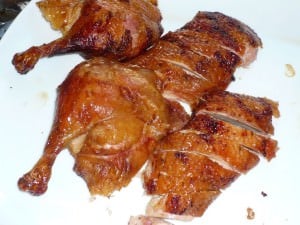
Would you like to save this recipe?
OK, I know I'm deluding myself. I live in Northeastern Ohio. It's going to snow the first week of April. It always does. But...when you have one of these gorgeous, 59*F, not a cloud in the sky spring days in early March, it always lifts my spirits. And after this winter, which has been particularly brutal, I'm willing to deny years of cold reality and start believing that spring is here.* And how do you think I celebrate spring? I bring out the charcoal, because it's time to grill!
*In fact, I'm ready to skip straight to summer. When I was at the mall, I started looking at the Tommy Bahama hawaiian shirts. I had to talk myself down:
Me: Put it back, you won't be able to wear it for another four months.
Myself: But...but...I want it to be summer right now! And that color! It reminds me of the ocean! I want to go to the beach!
Me: Will you listen to yourself? Put that shirt down right now! Down! Besides, it's got flowers on it. What will people think?
Myself: So you're saying I should get the burnt orange one instead?
Me: Wow! That is a cool color. We'd look great at the beach...What am I saying? Stop! Put it down!
**And yes, the voices in my head are telling me to grill again.
Recipe: Rotisserie Smoked Duck
Cook time: 90 minutes
Equipment:
- Grill with Rotisserie attachment (I used a Weber kettle with the Rotisserie attachment this Weber Grill
and this Weber charcoal kettle rotisserie
)
- Aluminum foil drip pan (9"x12", or whatever fits your grill)
- Butcher's twine
- 1 whole duck, 5-6 pounds
- 2 teaspoon kosher salt
- ½ orange (optional)
- smoking wood chunk (hickory or a fruit wood, half the size of your fist. Only do this if you're using charcoal)
- fresh ground pepper
Directions:
Note: for an overview of the technique, see my rotisserie poultry post.
1. Pre-Salt the duck:24 to 48 hours before you cook the duck, salt the duck evenly - about ½ teaspoon on the breast, ½ teaspoon on the legs, ½ teaspoon on the back, ½ teaspoon in the cavity, and ½ teaspoon in the neck. Put the duck on a rack over a roasting pan or baking sheet, and store in the refrigerator, uncovered. This lets the skin dry, and gives the salt time to dry brine the duck.
2. Prep the duck: One hour before cooking, stuff the duck with the half an orange, truss the duck, and skewer the duck. Let it rest at room temperature. Put the wood chunk in a bowl of water to soak.
[Update 12/5/09]: This is also a good time to pierce the skin of the duck all over with a paring knife. This helps the fat escape from under the skin; just be careful that you don't pierce the duck flesh while you're doing it. I do this by coming at the duck from a very low angle, almost parallel to the skin.
3. Prep the rotisserie: Prepare your rotisserie for cooking on indirect high heat (see details My Rotisserie Basic Technique Post). For my Weber kettle, I light a chimney full of charcoal, wait for it to be covered with ash, then pour it in two equal piles on the sides of the grill. I put the drip pan in the middle, between the piles. Then I put the wood chunk on top of the charcoal, and give it five minutes to start smoking.
4. Cook the duck: Put the spit on the grill, and cook the duck with the lid closed for 1 ½ to 2 hours. After an hour, add 10 charcoal briquettes to each pile of charcoal, to kick the heat back up. Start checking the temperature in the thigh after about 1 hour 15 minutes. You want the thigh to be 180*F to 190*F. It should take an hour and a half to two hours to finish cooking. Remove from the grill and let rest for 10-15 minutes before carving.
5. Carve the duck: Cut off the wings and legs, and serve them bone in; carve the breasts off the carcass, and slice them into ½" thick slices. Serve one wing, thigh and breast per person.
*This is not the recipe you want if the only way you'll eat a duck breast is medium rare. The legs will be so tough as to be inedible if you don't cook them to well done, and you won't get the wonderful crispy duck skin that is the high point of this recipe.
To cook the legs to where they need to be, and to render enough fat to make the skin crisp up, you need to cook the whole duck to well done. The breasts are a little dry this way, but as long as you get some of that wonderful duck skin with it, you'll enjoy it.
*Also, this is not a recipe for big eaters, unless you're eating alone. There isn't a whole lot of meat on a duck, and it's also very long. I can fit two of them across on my jumbo gas grill, but it looks like I can only fit one on my kettle grill skewer.
*Rotisserie potatoes as a side dish. Potatoes + duck fat = heaven. Trust me - cook some potatoes in the duck fat and drippings!
*Duck has a LOT of fat on it, so don't do this if you have any fat phobias. I want to try to rig up a drain rack next time - I'm going to nest two pans, and punch holes in the top one so the fat can drip onto the potatoes, then drain into the lower pan.
*Charcoal notes: A full chimney of charcoal gave me a starting temp of 450*F; after an hour the temp was down to 375*F, and after an hour and a half it was down to 275*F. This is one of the advantages of charcoal. You get quick, high heat at the start, and the temperature moderates as your cooking time progresses. This makes it hard to overcook the duck.
Questions? Suggestions? Ideas? Leave them in the comments.
Related Posts:
Rotisserie Duck, Peking Style recipe
Try Rotisserie pan potatoes with the duck. Duck fat potatoes are amazing!
Brined Rotisserie Chicken recipe.
My other rotisserie recipes.
Inspired by:
Steven Raichlen's Rotisserie episode of "Primal Grill"
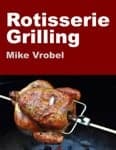 Check out my cookbook, Rotisserie Grilling. Check out my cookbook, Rotisserie Grilling.
Everything you could ask about the rotisserie, It's a Kindle e-book, so you can download it and start reading immediately! |
*Enjoyed this post? Want to help out DadCooksDinner? Subscribe to DadCooksDinner using the RSS or Email options on the right, link to this post from your blog, recommend DadCooksDinner to your friends, or buy something from Amazon.com through the links on this site. (Like my Rotisserie Grilling cookbook...)

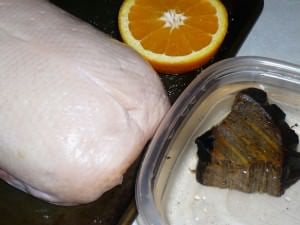
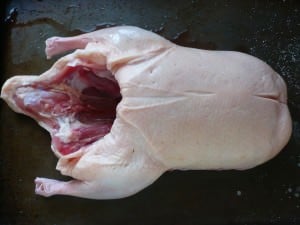
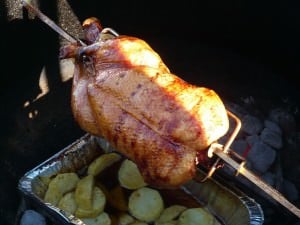
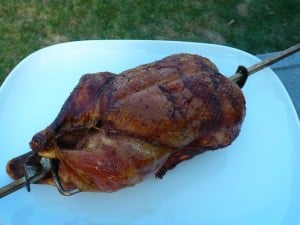
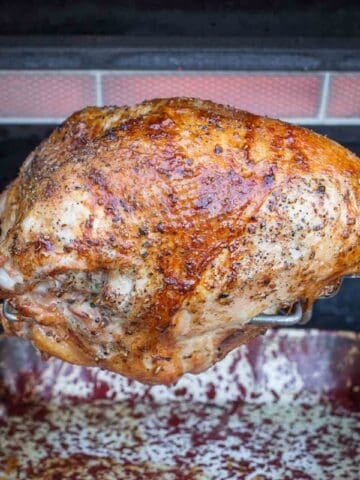
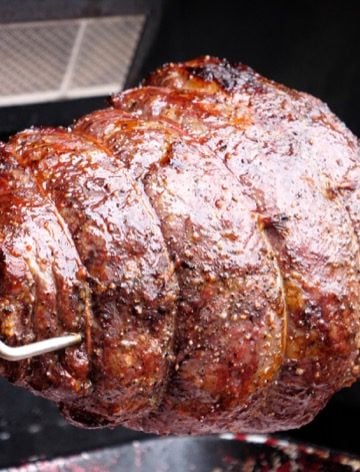
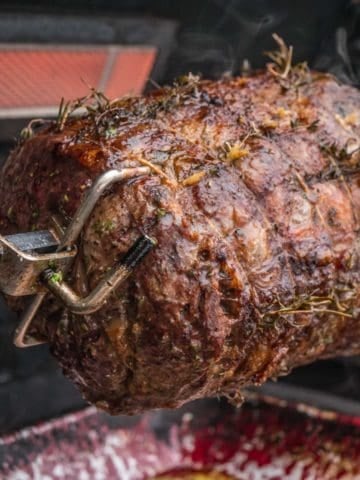
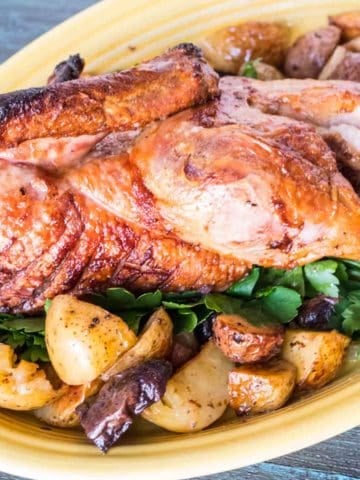
MikeV @ DadCooksDinner says
@Stephen in Connecticut:
Thank you!
stever says
I have made duck before but over the gas grill with a rotisserie duck this is the way to go...
The duck took about 3 Hours to cook all i used was salt pepper and 1 Orange....and 1 fresh duck
Its a warm Jan 2nd here in COnnecticut and I am thankfull I used the advice above
Stephen in Connecticut
Anonymous says
Rotisseried a duck over charcoal for our first attempt at cooking a duck and it was delicious. Did a combination of your 2 recipes and it worked out great.
Anonymous says
I just cooked a 5 lb duck on my Ronco 1 1/2 hour in slot A then I moved it to B for 10 mins to finish browning. "Awsom" The breast meat was very juicy & they legs were perfect. I poked holes in skin tied it up tight, sprayed with oilve oil seasoned with thyme,rosemary,salt,pepper.
MikeV @ DadCooksDinner says
@Paul:
Thanks! I've read the "dip in boiling water" tip in a number of recipes, but have never tried it. I've always substituted the dry brine plus leaving overnight in the fridge to dry out the skin. Next time I make a duck, I'll have to give it a try...
Paul says
I always pierce the skin a few hours beforehand, and pour a kettle of boiling water over the duck to render some of that fat right under the skin. You can see the skin tighten as you pour. Then I dry with paper towels and put in the fridge to dry. You won't ever have that fireball issue if you use this technique.
MikeV @ DadCooksDinner says
@Larry:
Dry brine? Correct, dry brine the duck. (I hadn't heard that way of referring to the pre-salting when I wrote this recipe up; I had picked it up by the time I got to my Rotisserie Peking Duck recipe.)
Pierce the skin through the fat? I've done it both ways (again, see the peking duck recipe for my poking technique), and there was a little less fat in the pierced Peking duck. It wasn't a huge difference; duck has a ton of fat. If you've got the time, and are comfortable with making a lot of small holes through the skin without piercing the meat, then I would recommend doing it. My technique is to come at the skin from a very low angle - almost parallel to the duck. That way, I just get the tip of the knife under the skin, but don't pierce the meat.
Thanks for the questions!
Larry says
Mike, you suggest dry brining the duck. Correct? Also, I have read some other recipes that suggest to pierce the skin, through the fat to the meat to allow the the fat to drain. Do you do that? Thanks.
MikeV @ DadCooksDinner says
@Adam:
Thanks for the update! And, thanks for the flash point information - I was trying to find that myself, but your google skills must be better than mine. All I could find was the flash points for various cooking oils.
From what I know about heat transfer (mainly from watching a lot of Good Eats, and reading On Food and Cooking by Harold McGee), the internal temperature of the grill isn't going to matter - you just can't transfer enough heat through air to get the oil hot enough for it to flame, unless you leave it there for hours and hours.
I have the same guess that you do - the open flame connected with the fat somehow, and it jumped to the pan once it got going. As I said in my previous comment, I've caused a few fires myself with various kinds of poultry and direct heat. (My worst one was chicken legs over direct low heat. I had a black smoke pouring out of my grill. And chicken legs don't produce anywhere near as much fat as duck does.)
Indirect heat plus the drip pan has always worked for me; I've never had a fire that way. I think of the rotisserie burner as a particularly effective indirect heat - because it's on the side of the grill, there's no way for fat to drip on it.
Good luck next time, and please let me know how it goes!
MikeV
Adam says
@DadCooksDinner:
All good questions and any of those direct causes were possible. The pan was under direct heat but on a low-temp burner (next time I'll turn it right off). There is a rotisserie burner that is in the back, above the grill. It's possible that it was close enough to the dripping fat to ignite it (though unlikely). Or perhaps the temperature inside the bbq was above the flash point of the duck fat. I've queried 'What is the flash point of duck fat?' in google and found one useful table: http://tinyurl.com/yjou3sv. According to the Handbook of food science, technology and engineering, the flash point of lard is 282 degrees celsius (539 F), and the fire point is 352 degrees celsius (665 F). I suppose it's possible that my bbq was in the 540 F range, but unlikely.
I dunno. I think that an open flame somehow ignited the fat. Lesson learned - keep an eye on things, watch the temperature and direct heat, make sure that the drip pan doesn't come into contact with the open flame. I'll give it a go again sometime and will let you know how it goes. Keep on cookin' Daddio!
MikeV @ DadCooksDinner says
@Adam:
Wow. I'm sorry to hear that! I don't think a 400*F internal temperature is hot enough to start fat on fire...unless the pan is over direct heat, or the fat actually gets into the fire itself. Did you have a lit burner under the drip pan, or coals actually touching the drip pan? Or was the duck dripping onto a lit burner or the coals?
Duck does render a whole lot of fat when it's cooking. That's why I use the indirect heat - it should keep the fat from catching fire. I started a grease fire of my own the one time I tried to cook duck breasts over direct heat.
MikeV
Adam says
Tried this the other day and though I'm sure it's a wonderful recipe I had disasterous results. My BBQ was evidentally too hot as the grease in the drip pan caught fire and completely incinerated the duck. I was indoors when the fire caught. By the time I caught it - 5 mins after it started probably - it was too late. The flames were 8 feet high and there was thick black smoke everywhere. My neighbours were alerted by the acrid smell and came running out. I eventually extinguished the flames by smothering the blaze with baking soda. The duck was completely destoyed. I'm not sure how high the temperature was in my bbq (thermometer is broken), but I was probably in the 400 range. At what temperature does fat catch fire?
MikeV says
@Beth:
Wow, that sounds like a great way to spend your time to me!
Beth says
Thanks for the tips! We're sitting near Puget Sound in Port Townsend, WA in an RV - facing the channel & watching the ships & boats... We're putting a duck on the electric rotisserie tomorrow for friends... It's a tough life...
Anonymous says
Ill try it tonight sounds good